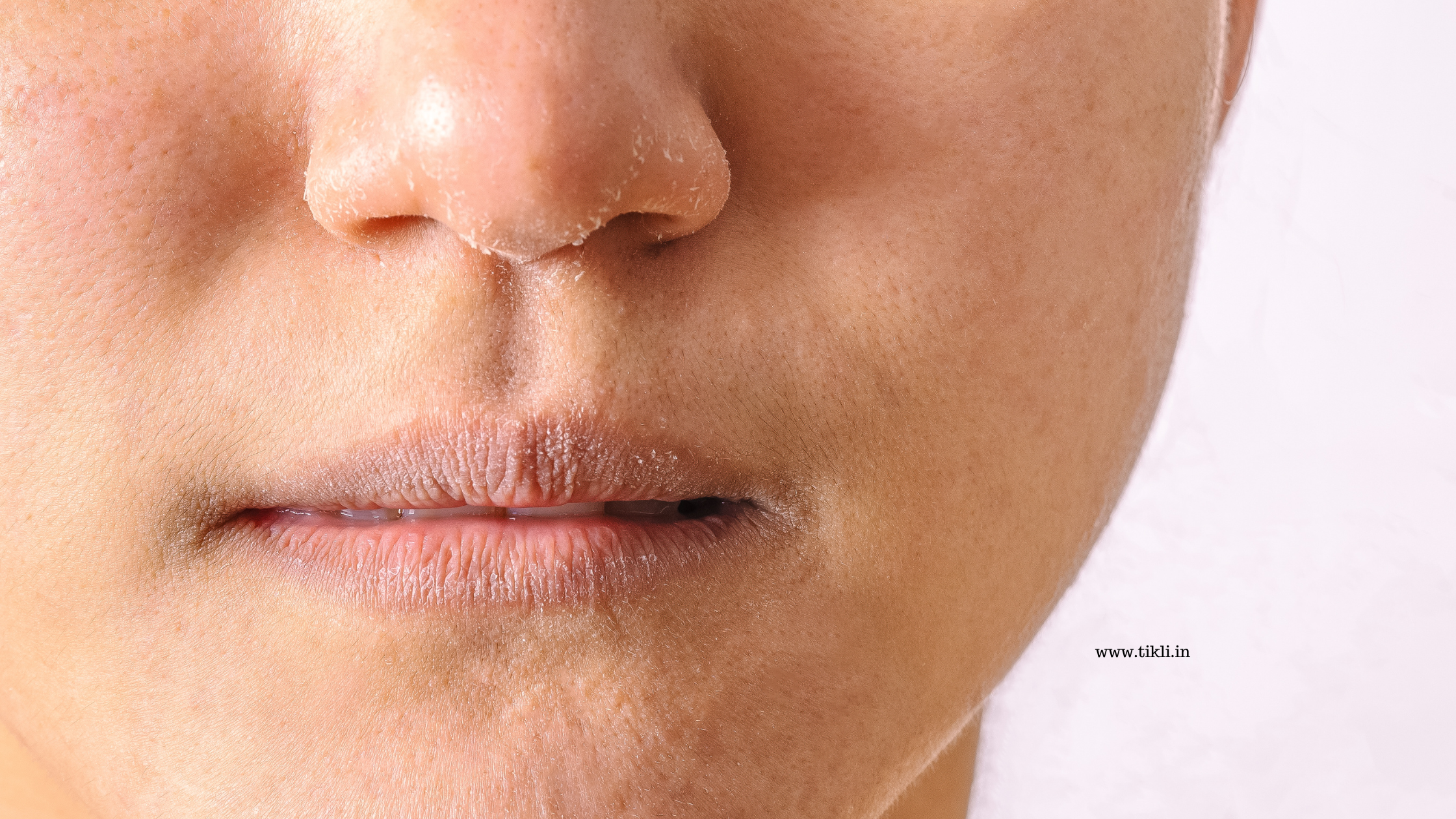Dry skin can be a real nuisance, causing itching, flaking, and redness. It can be caused by a variety of factors, including cold weather, dehydration, and certain skin conditions. Dry skin can be a common issue for many people, especially during the winter months when the air is cold and dry. Dry skin occurs when the skin is not able to retain enough moisture, which can lead to itching, flaking, and even cracking.

Factors that can contribute to dry skin.
1. Weather:
Cold, dry weather can strip the skin of its natural oils and lead to dryness and flakiness.
2. Hot showers and baths:
Hot water can strip the skin of its natural oils, leading to dryness and itching.
3. Harsh soaps and detergents:
Certain soaps and detergents can strip the skin of its natural oils and cause dryness.
4. Age:
As we age, our skin becomes thinner and loses its natural oils, making it more prone to dryness.
5. Medical conditions:
Certain medical conditions such as eczema, psoriasis, and hypothyroidism can cause dry skin.
6. Dehydration:
Not drinking enough water can lead to dehydration, which can cause dryness and flakiness.
7. Genetics:
Some people are simply more prone to dry skin due to their genetics.
8. Medications:
Certain medications, such as diuretics and acne medications, can cause dry skin as a side effect.
It is important to identify the cause of your dry skin in order to properly treat and manage it. If you are struggling with dry skin, it may be helpful to speak with a dermatologist who can help diagnose any underlying skin conditions and recommend specific treatments or products to help improve the look and feel of your skin.
Best tips for taking care of dry skin.
1. Moisturize regularly.

One of the most important things you can do for dry skin is to moisturize regularly. Look for a moisturizer that is specifically formulated for dry skin and apply it after showering or bathing while your skin is still damp. This will help lock in moisture and prevent dryness.
2. Use a humidifier

Dry air can be particularly harsh on dry skin. Using a humidifier can help add moisture to the air, which can be especially helpful during the winter months. Place a humidifier in your bedroom while you sleep to help keep your skin hydrated.
3. Avoid hot water
Hot water can strip your skin of its natural oils, leaving it feeling even drier. Instead, use lukewarm water when showering or bathing, and limit your time in the water to 10-15 minutes.
4. Choose gentle products
When it comes to skincare products, less is often more for those with dry skin. Look for gentle cleansers and avoid products that contain alcohol or fragrances, which can be particularly harsh on dry skin.
5. Exfoliate gently
While exfoliation can be beneficial for removing dead skin cells, it is important to be gentle when doing so. Avoid harsh scrubs and instead opt for a gentle exfoliating cleanser that is formulated for dry skin.
6. Drink plenty of water
Dehydration can make dry skin worse, so it is important to drink plenty of water throughout the day. Aim for at least eight glasses of water per day to help keep your skin hydrated.
7. Eat a healthy diet

Eating a healthy diet that is rich in vitamins and minerals can help keep your skin healthy and hydrated. Foods that are particularly beneficial for dry skin include oily fish, nuts, avocados, and sweet potatoes.
8. Avoid harsh weather conditions
Cold, windy weather can be particularly harsh on dry skin. If you must be outside in harsh weather conditions, be sure to protect your skin with a scarf, hat, and gloves.
9. Protect your skin from the sun
While sun exposure is important for the body to produce vitamin D, it can also be harmful to dry skin. Protect your skin from the sun by wearing a broad-spectrum sunscreen with an SPF of at least 30, and wear protective clothing, such as a hat and long-sleeved shirt.
How To Add Extra Moisture During Winters

Winter can be particularly harsh on dry skin, as the cold weather and indoor heating can strip the skin of its natural moisture. Here are some tips for adding extra moisture to dry skin during the winter months:
1. Use a humidifier:
A humidifier adds moisture to the air, which can be particularly helpful during the winter months when the air is dry. Place a humidifier in your bedroom while you sleep to help keep your skin hydrated.
2. Moisturize regularly:
Moisturize your skin regularly with a thick, emollient moisturizer that is specifically formulated for dry skin. Apply moisturizer immediately after showering or bathing while your skin is still damp to help lock in moisture.
3. Avoid hot showers and baths:
Hot water can strip your skin of its natural oils, leaving it feeling even drier. Instead, use lukewarm water when showering or bathing, and limit your time in the water to 10-15 minutes.
4. Apply body oil:
Adding a body oil to your skincare routine can help provide extra moisture to dry skin during the winter months. Look for a body oil that contains hydrating ingredients like jojoba oil, sweet almond oil, or avocado oil.
5. Use a hydrating mask:
Applying a hydrating mask to your face once or twice a week can help provide extra moisture to dry skin. Look for a mask that contains ingredients like hyaluronic acid, glycerine, or aloe vera.
6. Drink plenty of water:
Dehydration can make dry skin worse, so it is important to drink plenty of water throughout the day. Aim for at least eight glasses of water per day to help keep your skin hydrated.
7. Eat a healthy diet:
Eating a healthy diet that is rich in vitamins and minerals can help keep your skin healthy and hydrated. Foods that are particularly beneficial for dry skin include oily fish, nuts, avocados, and sweet potatoes.
8. Protect your skin from the cold:
Cold weather can be particularly harsh on dry skin. Protect your skin by wearing a scarf, hat, and gloves when you go outside.
By following these tips, you can help add extra moisture to dry skin during the winter months and keep your skin healthy and hydrated. However, if you are struggling with severe dry skin, it may be helpful to speak with a dermatologist who can recommend specific treatments or products to help improve the look and feel of your skin.
DIY face pack for dry skin
If you have dry skin, using a face pack can help add moisture to your skin and leave it feeling soft and smooth. Here is a recipe for a DIY face pack for dry skin:
1. Banana Face Pack for Dry Skin
Bananas are rich in vitamins and minerals that can help nourish dry skin, including vitamin A, vitamin C, and potassium. Honey is a natural humectant, which means it helps draw moisture into the skin. It also has antibacterial properties that can help keep the skin healthy. Plain yogurt contains lactic acid, which can help exfoliate and hydrate dry skin.
By using this face pack once or twice a week, you can help add moisture to your dry skin and leave it feeling soft and smooth.
Ingredients:
- 1 ripe banana
- 1 tablespoon honey
- 1 tablespoon plain yogurt
Instructions:
- Mash the banana in a bowl until it forms a smooth paste.
- Add the honey and plain yogurt to the bowl and mix well.
- Apply the mixture to your face, avoiding the eye area.
- Leave the face pack on for 10-15 minutes.
- Rinse off the face pack with lukewarm water and pat your skin dry.
2. Avocado and honey face pack:
Avocado is rich in healthy fats and vitamins that can help nourish and hydrate dry skin. Honey is a natural humectant, which means it helps draw moisture into the skin. It also has antibacterial properties that can help keep the skin healthy.
Ingredients:
- 1 ripe avocado
- 1 tablespoon honey
Instructions:
- Mash the avocado in a bowl until it forms a smooth paste.
- Add the honey to the bowl and mix well.
- Apply the mixture to your face, avoiding the eye area.
- Leave the face pack on for 15-20 minutes.
- Rinse off the face pack with lukewarm water and pat your skin dry.
3. Oatmeal and milk face pack:
Oatmeal is a gentle exfoliant that can help remove dead skin cells and promote cell turnover. Milk contains lactic acid, which can help exfoliate and hydrate dry skin. Honey is a natural humectant that helps draw moisture into the skin.
Ingredients:
- 1/2 cup rolled oats.
- 1/4 cup milk
- 1 tablespoon honey
Instructions:
- Grind the rolled oats in a blender until they form a fine powder.
- In a bowl, mix the oat powder, milk, and honey until well combined.
- Apply the mixture to your face, avoiding the eye area.
- Leave the face pack on for 15-20 minutes.
- Rinse off the face pack with lukewarm water and pat your skin dry.
4. Aloe vera and cucumber face pack:
Aloe vera is a natural moisturizer that can help soothe and hydrate dry skin. Cucumber contains antioxidants and vitamin C, which can help brighten and hydrate the skin. Together, these ingredients can help add moisture and radiance to dry skin.
Ingredients:
- 1/2 cup aloe vera gel
- 1/2 cucumber peeled and chopped.
Instructions:
- In a blender, blend the cucumber until it forms a smooth paste.
- In a bowl, mix the cucumber paste and aloe vera gel until well combined.
- Apply the mixture to your face, avoiding the eye area.
- Leave the face pack on for 15-20 minutes.
- Rinse off the face pack with lukewarm water and pat your skin dry.
In conclusion, dry skin can be a frustrating and uncomfortable condition, but with the right care, it is possible to improve the look and feel of your skin. By moisturizing regularly, using a humidifier, avoiding hot water, choosing gentle products, exfoliating gently, drinking plenty of water, eating a healthy diet, avoiding harsh weather conditions, protecting your skin from the sun, and considering seeing a dermatologist, you can help keep your skin healthy and hydrated.









